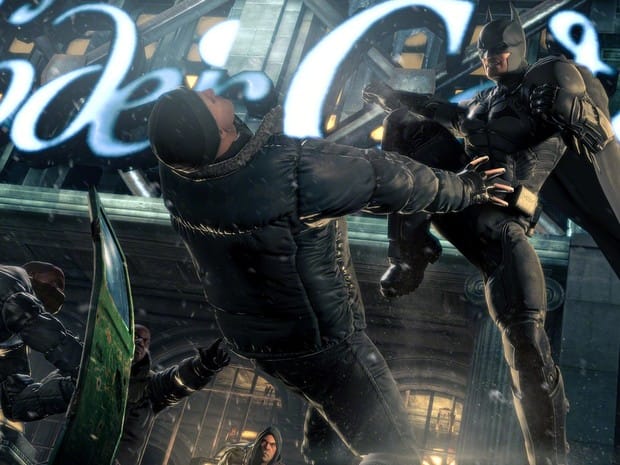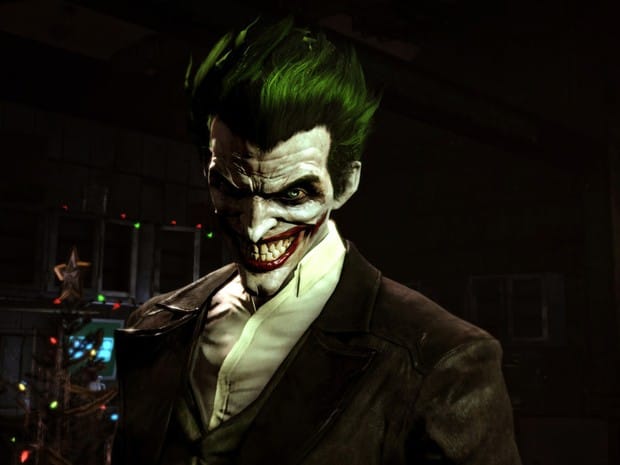Batman: Arkham Origins is one big identity crisis

The whole idea of Batman: Arkham Origins makes little sense. It’s a prequel, not the origin story of Batman—the marketing is adamant about that. Rather, the press review guide says it “explores the origins of Batman’s relationships with his biggest foes.”
It’s questionable how well it does that.
Take a look around Gotham, and it doesn’t look any younger. The open-world city that Warner Bros. Games Montréal constructed in place of original developer Rocksteady Studios is nearly identical in design. Only it’s snowing, and well, Christmas. Holiday decorations and themed pin-up calendars adorn the town. Batman is a bit gruffer and newer to the game.
Playing Arkham Origins feels like picking up Arkham City after months away.
You’re not. You’ve seen this before. Batman’s up to the same hijinks as in the past two games—everything from fighting thugs with stun batons and shields to pulling himself around on a makeshift water raft. He’s got some new enemies to face and gadgets to use, like the random martial arts experts and the glue grenade, but those are novelties. Playing Arkham Origins feels like picking up Arkham City after months away.
But gameplay and world-building aren’t what Warner Bros. had in mind when it thought “origins.” It just threw in some new toys and plenty of villains for Batman to wrangle. Fighting eight assassins and one crazed clown are the reason for continuing a series that should have died where Rocksteady left it.

Not that it’s not fun playing as Batman again. Warner Bros. is well aware of how fun the combat is. There’s a rhythmic tactility to it that emerged fully formed in the first game, and it has been made more and more purposeful with each iteration. Most of the game is devoted to it—a bigger world with more NPC encounters, combat performance feedback, upgrades, a suite of challenges and now multiplayer. What shrank is the story, and its smaller presence reflects a lack of imagination—a cluelessness about what creative direction to move the series in.
In fact, it can seem like storytelling and combat became one in the developers’ minds. For the most part, Arkham Origins never delves into the origins it promises. Batman’s “relationship” with the Electrocutioner, a brute with a big mouth and shock gloves, consists of a mean kick to the face. His showdown with the pyromaniac Firefly involves tossing a bunch of incapacitating gadgets and then sprinting across a bridge crowded with vehicles and flames. His meetings with Bane continue until the Venom-superpowered giant finally falls and forgets why he even cares about hunting Batman (two words: brain damage).
These relationships are founded on violence, not story.
The assassins are all motivated by either the promise of 50 million bucks or a seething hatred that the game never quite bothers to explain. These relationships are founded on violence, not story. They’re explored through combat. The villains might as well be more dangerous versions of the petty criminals Batman beats down on the snow-laced streets of Gotham.

Arkham Origins does a few relationships justice: the origins of Batman’s relationship with an antagonistic James Gordon, and the computer genius and future Batgirl, Barbara, for example. Not surprisingly, the Joker—a new threat introduced halfway through—is one foe that Arkham Origins gets right. Arguably the best part of the game is a hallucinogenic look inside the Joker’s mind, similar to Batman’s drug trip when high on the Scarecrow’s toxin in Arkham Asylum. Players walk through the sequence as the Joker and his alter ego, Red Hood, back when the accident at a chemical plant washed his skin white and his hair green. The enormous, wooden heads of sinister carnival clowns spew fire as a demonic bat stalks the Joker in the dark. Here’s an origin told in real time, with playful, purposeful shifts in tone and mechanic.
It sticks out like a sore thumb. This purported prequel is more of a sequel, with a city and mechanics you’ve seen before. It typifies the “prequel as water-tread.” Rather than proceed forward with a narrative, or build upon the universe created, Warner Bros. Montreal trembles in Rocksteady’s absence, afraid to lose the big fish it has on the hook. Rocksteady gave its games heart. They gave the games drama and character. Arkham Origins sees people only as a conduit for XP or as a target for a mean right hook.
Head Image from Bart Heird



